Diplomatic Bluebook 2023
Chapter 2
Japan's Foreign Policy by Region
3 Countries in Central Asia and the Caucasus
(1) Overview
Countries in Central Asia and the Caucasus are situated in a location of geopolitical importance that connects East Asia, South Asia, the Middle East, Europe, and Russia, and have abundant natural resources such as oil, natural gas, uranium, and rare metals. Stability of the region as a whole, including the countries in Central Asia and the Caucasus, has significant importance in addressing key challenges that the international community faces such as fighting against terrorism and countering illicit drugs. Japan continues to work to strengthen bilateral ties with these countries through high level talks and will be continuing initiatives to promote regional cooperation using the framework of the “Central Asia plus Japan” Dialogue.
2022 marks the 30th anniversary of the establishment of diplomatic relations between Japan and Central Asia and Caucasus countries. Prime Minister Kishida and Foreign Minister Hayashi exchanged congratulatory messages with the leaders and foreign ministers of the respective countries, and actively implemented initiatives to strengthen relations, including high-level bilateral exchanges (see the Column on page 160). In light of the growing importance of the “Caspian Sea Route,” a transportation route that bypasses Russia and links Central Asia and Europe via the Caucasus region, following Russia's aggression against Ukraine, the Ministry of Foreign Affairs (MOFA), together with relevant ministries, agencies, and Japanese companies, formed a study team to survey the route in Kazakhstan and Azerbaijan.
The Central Asia and Caucasus countries, with a few exceptions, have been absent from or abstained from UN General Assembly resolutions related to Russia's aggression against Ukraine, and many of them have avoided making their positions clear publicly. Uzbekistan has consistently explained that the country's position is “objective and neutral.” In June, President Jomart Tokaev of Kazakhstan refused to recognize the “Donetsk People's Republic” and “Luhansk People's Republic” in front of Russian President Putin at the St. Petersburg International Economic Forum. While Tajikistan has not made any external comments on Russia's aggression against Ukraine, it drew public attention when President Emomali Rahmon of Tajikistan made remarks to Russian President Putin at the Central Asia-Russia Summit in October, that policies like those of the former Soviet Union were still in place in Central Asia and that he hoped they would be respected.
・Trade: China is the largest export destination, but exports to Italy (exports of natural resources from Kazakhstan and Azerbaijan) and Russia are also large. In terms of import, Russia is still exceeding China as it has large trade volumes with Kazakhstan, Uzbekistan, and Azerbaijan. In 2021, Japan ranked 25th in terms of its share in the region's export and 16th in terms of import.2
・Investment: The U.S. has the second largest presence in Kazakhstan, which accounts for about 70% of the region's FDI stock (the largest investor in Kazakhstan is the Netherlands). This is followed by France, the UK and China. In addition, Russia maintains a certain presence in the former Soviet Union bloc countries, as it is a major investor in Kyrgyz Republic, Armenia, and Tajikistan. Japan's FDI in the region is not particularly noticeable except in Kazakhstan and is below the U.S., the UK, China and Russia in scale.
・Finance: The region has the largest bilateral external debt to China, but this has been declining in recent years. Japan is a creditor mainly in Turkmenistan and Uzbekistan, and ranks second as of 2021.
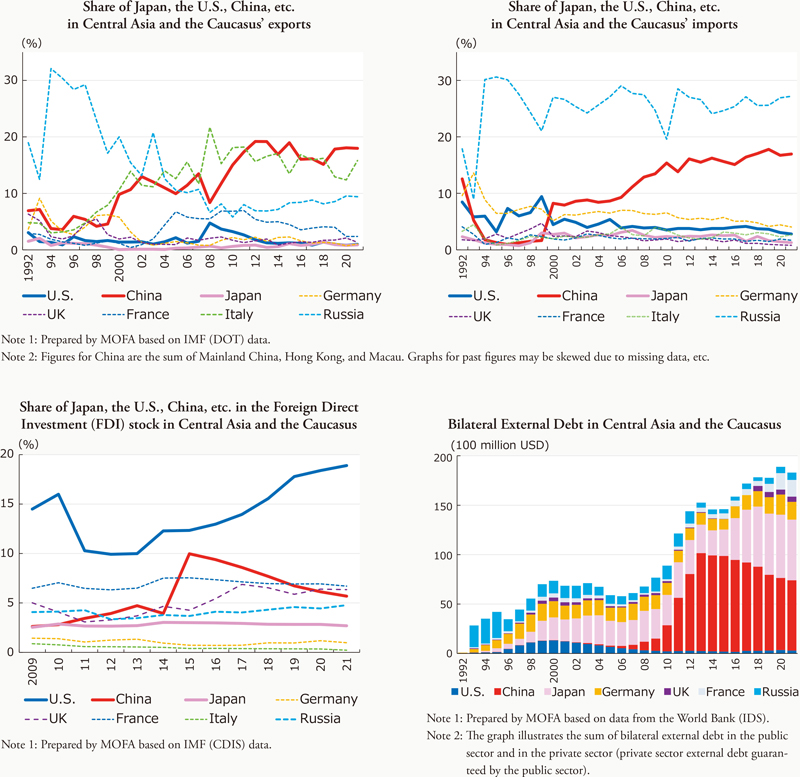
- 1. See page193 for notes regarding this data.
- 2. While only limited number of countries such as Japan, the U.S., and China are illustrated in the chart the rankings in the text are for all countries/regions for which data are available (including countries, etc. in the relevant region).
(2) Central Asian Countries
The countries of Central Asia are partners of Japan in maintaining and strengthening a free and open international order, and Japan is promoting diplomacy aimed at contributing to peace and stability in Central Asia.
In April, the Eighth Foreign Ministers' Meeting of the “Central Asia plus Japan” Dialogue was held online, where foreign ministers exchanged opinions on regional affairs including Russia's aggression against Ukraine. Foreign Minister Hayashi also visited Kazakhstan and Uzbekistan. In December, the foreign ministers of the five Central Asian countries visited Japan for the first time together, where the Ninth Foreign Ministers' Meeting of the “Central Asia plus Japan” Dialogue was held in Tokyo for the first time in 10 years. The foreign ministers decided to establish and promote a new development model focusing on “investment in people” and “quality of growth” to achieve sustainable development in Central Asia, and exchanged views on the “Caspian Sea Route.” They also candidly exchanged views on how to respond to Russia's aggression against Ukraine and the situation in Afghanistan.
 The Ninth Foreign Ministers' Meeting of the “Central Asia plus Japan” (December 24, Tokyo)
The Ninth Foreign Ministers' Meeting of the “Central Asia plus Japan” (December 24, Tokyo)While there was continued progress in intra-regional cooperation among the Central Asian countries, with the Fourth Consultative Meeting of the Heads of State of the Central Asian countries held in July, and an agreement on border demarcation was reached between Uzbekistan and the Kyrgyz Republic in November, military clashes broke out in September near the border between the Kyrgyz Republic and Tajikistan. A cease-fire agreement was reached within the same month, but on the Kyrgyz side, approximately 140,000 people were temporarily internally displaced. In response to the deterioration of the humanitarian situation in the Kyrgyz Republic, the Japanese government decided to provide emergency grant aid of 1 million US dollars through the UN World Food Programme (WFP) and the UN High Commissioner for Refugees (UNHCR).
In Uzbekistan, President Shavkat Mirziyoyev continues to pursue a reform path. Japan has actively engaged in high-level political dialogue with Uzbekistan, including a visit to Japan by Deputy Prime-Minister and Minister of Investments and Foreign Trade Sardor Umurzakov in April, a visit to Uzbekistan by Foreign Minister Hayashi, a telephone call between Prime Minister Kishida and President Mirziyoyev in June, and a foreign ministers' meeting in December. Foreign Minister Hayashi met with Foreign Minister Vladimir Norov, who visited Japan in December for the Ninth Foreign Ministers' Meeting of the “Central Asia plus Japan” Dialogue, where the ministers exchanged views on cooperation in the areas of labor, environment, climate change and human resource development as well as on the regional situation.
In Kazakhstan, unrest broke out across the country in January, mainly in Almaty, but the situation was calmed by the deployment of Russian-led Collective Security Treaty Organization (CSTO) peacekeeping forces at the request of Kazakhstan. The Government of Kazakhstan has attributed the unrest to an attempted coup d'etat by former Chair of the National Security Committee Karim Massimov and others. The upheaval led to the retirement of first President Nursultan Nazarbayev from the position of Chairman of the Security Council and strengthened President Kassym-Jomart Tokayev's efforts at large-scale domestic reforms. In June, a referendum was held to amend the constitution, and in September, the name of the capital city was restored from Nur-Sultan to Astana. In November, President Tokayev was inaugurated after the reelection in an early presidential election. In relations with Japan, Foreign Minister Hayashi visited Kazakhstan in April and held talks with President Tokayev and Deputy Prime Minister and Foreign Minister Mukhtar Tileuberdi. In September and December, Foreign Minister Hayashi also met with the Foreign Minister of Kazakhstan and exchanged views on cooperation in the energy and decarbonization sectors, regional affairs, and other issues.
In relations with the Kyrgyz Republic, Foreign Minister Hayashi met with Minister of Foreign Affairs Zheenbek Kulubaev in September and December. During the December meeting, the two ministers signed a Cooperation Program between the ministries for 2023 to 2025, and shared the view to further promote bilateral relations and stimulate dialogue. In addition, Minister of Foreign Affairs Kulubaev expressed his gratitude for the support provided by Japan to date, including the emergency grant aid in October.
In relations with Tajikistan, First Deputy Prime Minister Davlatali Said and Foreign Minister Sirojiddin Muhriddin each visited Japan in December. During his meeting with Foreign Minister Muhriddin, Foreign Minister Hayashi signed a cooperation program between the two countries' foreign ministries for 2023 to 2025, and confirmed that the two ministries would work closely together on bilateral cooperation, including human resource development and infrastructure development, as well as on the regional situation.
In Turkmenistan, Serdar Berdimuhamedov, the eldest son of President Gurbanguly Berdimuhamedov, was elected as the new president in March. In relations with Japan, Prime Minister Kishida held a telephone call with President Berdimuhamedov in April, followed by a meeting between Prime Minister Kishida and Chairman of the Halk Maslakhaty, Milli Gengesh of Turkmenistan Berdimuhamedov (former President) in September. In December, Foreign Minister Hayashi met with Deputy Chairman of the Cabinet of Ministers and Minister of Foreign Affairs Rashid Meredov to strengthen economic ties, including in the area of decarbonization, and to strengthen cooperation in the areas of education and culture.
In recent years, efforts toward advancing regional cooperation have become active among Central Asian and neighboring countries. In 2022, leaders of Central Asian countries attended a variety of meetings that included the meeting of the Supreme Eurasian Economic Council of the Eurasian Economic Union (EAEU) in December, the Commonwealth of Independent States (CIS) Summit held in October, the Shanghai Cooperation Organization (SCO) Summit in September, and the Collective Security Treaty Organization (CSTO) Summit and the Summit of the Organization of Turkic States held in November.
In addition, there are active summits and foreign ministers' meetings in the format of the five Central Asian countries and another country. In 2022, Japan, the U.S., the EU, China, Russia, and the ROK each held a foreign ministers' meeting with the five Central Asian countries in this format, while the EU, China, India, and Russia held a summit meeting with them.
(3) Caucasus Countries
The Caucasus region has a potential to be a gateway connecting Asia, Europe and the Middle East, and geopolitical importance that directly affects the peace and stability of the international community. However, there are still outstanding issues such as in Georgia over South Ossetia and Abkhazia, and between Azerbaijan and Armenia over Nagorno-Karabakh. Japan announced the Caucasus Initiative in 2018, which is comprised of two pillars: (1) assistance for human resources development for state building (human resources development) and (2) assistance for paving the way to “Appealing Caucasus” (infrastructure development and business environment improvement), and develops its diplomacy in line with this initiative.
Regarding the Nagorno-Karabakh issue, Japan has taken the position that it hopes the remaining issues related to the conflict between the two countries will be resolved peacefully based on the principles of international law through dialogue, including with the OSCE Minsk Group. In 2022, there were efforts toward dialogue mediated by the U.S., the EU, Russia, and other countries on the basis of the cease-fire agreement reached through a joint statement by the leaders of Russia, Azerbaijan, and Armenia in November 2020. Meanwhile, the largest armed clashes since the agreement occurred in the border region in September, and in December, a group claiming to be an environmental group on the Azerbaijan side staged a protest along the Lachin corridor, the only transportation route connecting the Nagorno-Karabakh region and Armenia. In response, the Armenian side complained that the corridor had been blocked, creating a humanitarian crisis.
In relations with Azerbaijan, Japan and Azerbaijan signed a new tax convention in December that wholly amends the previous tax convention, which was succeeded after dissolution of the Soviet Union. It is expected that this convention will further promote investment and economic exchange between the two countries.
Regarding relations with Armenia, Foreign Minister Hayashi met with Foreign Minister Ararat Mirzoyan in New York in September, where they exchanged views on the regional situation and other issues. In Armenia, President Armen Sarkissian resigned before the end of his term in January 2022, and Vahagn Khachaturyan was elected president by the National Assembly in March.
In relations with Georgia, Foreign Minister Hayashi met with Foreign Minister Ilia Darchiashvili, who visited Japan in December. The two Ministers agreed to further strengthen bilateral relations, including strengthening regional connectivity with the “Caspian Sea Route” in mind and cooperation in the field of decarbonization based on the Memorandum of Cooperation on the Joint Crediting Mechanism (JCM) signed in September.
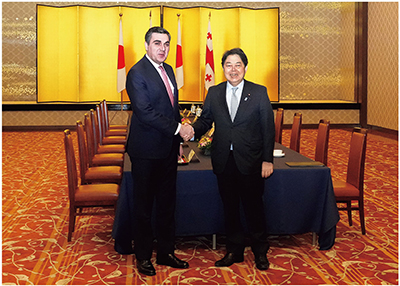 Japan-Georgia Foreign Ministers' Meeting (December 15, Tokyo)
Japan-Georgia Foreign Ministers' Meeting (December 15, Tokyo)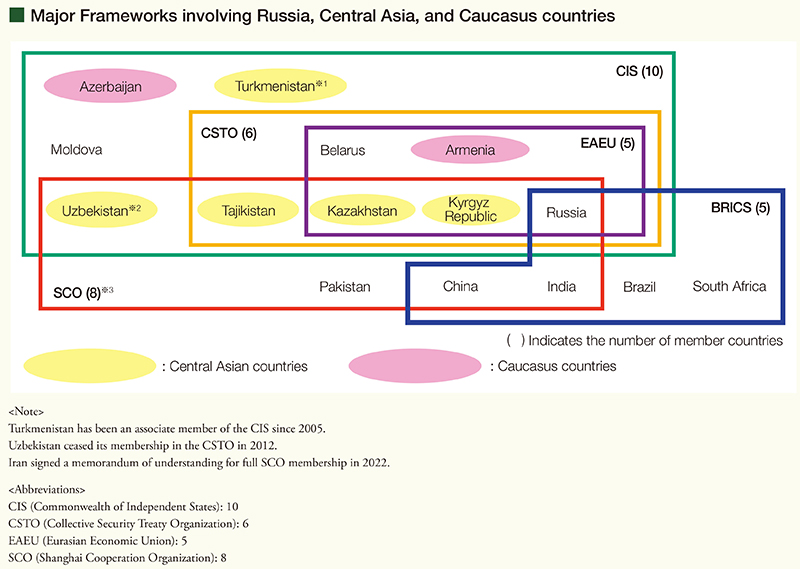
The countries of Central Asia and the Caucasus are located almost in the central part of the vast Eurasian continent and had prospered as hubs of the Silk Road connecting Europe and Asia in ancient times. They were annexed by Russia in the 19th century but became independent after the collapse of the Soviet Union in 1991. By September 1992, Japan had recognized these eight countries as states and established diplomatic relations. Japan and the countries of Central Asia and the Caucasus have developed exchanges in various fields over the 30 years since their independence.
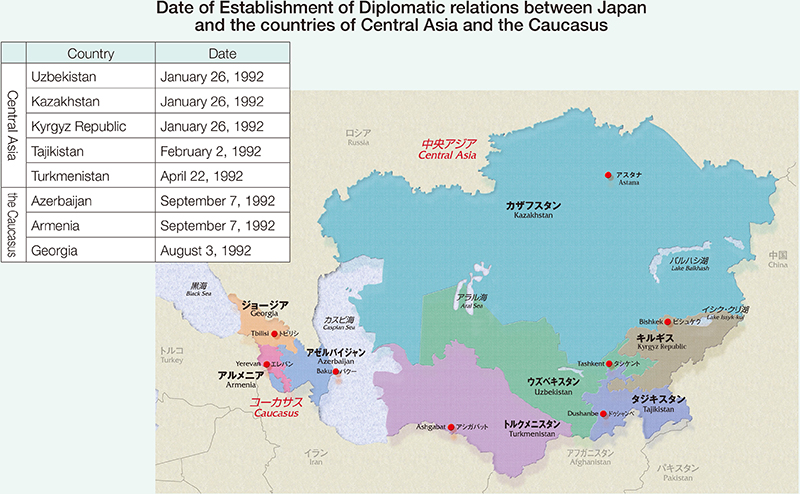
Japan launched the “Central Asia plus Japan” Dialogue in 2004 to promote regional cooperation for solving common regional issues. Such cooperation is indispensable for the stability and development of Central Asia. At present, other major countries are establishing frameworks for dialogue similar to Japan's, but the “Central Asia plus Japan” Dialogue is the pioneer of these. In 2015, Prime Minister Abe became the first Japanese Prime Minister to visit five Central Asian countries, and in 2018, Foreign Minister KONO Taro visited three Caucasus countries, furthering exchanges in various fields. Furthermore, in 2015, Japan opened the Embassy of Japan in Armenia, and today all eight countries have Japanese Embassies.
In 2022, the 30th anniversary of the establishment of diplomatic relations, active exchanges were held, including visits by high-level dignitaries, such as the visit to Japan by Foreign Minister Ilia Darchiashvili of Georgia in December, and the visit to Japan by the foreign ministers from five Central Asian countries all together for the first time to participate in the 9th Foreign Ministers' Meeting of the “Central Asia plus Japan” Dialogue. In addition, Prime Minister Kishida and the leaders of the countries in Central Asia and the Caucasus, along with Foreign Minister Hayashi and the foreign ministers of each country, celebrated the 30th anniversary of the establishment of diplomatic relations, and exchanged letters with each country affirming they would strive to further develop bilateral relations.
 The official logo for the 30th anniversary of the establishment of diplomatic relations between Japan and five Central Asian countries
The official logo for the 30th anniversary of the establishment of diplomatic relations between Japan and five Central Asian countries Concert by “Japanese Drum (Wadaiko) Group Sai” (November 20, Ashgabat, Turkmenistan)
Concert by “Japanese Drum (Wadaiko) Group Sai” (November 20, Ashgabat, Turkmenistan)An official logo for the 30th anniversary of the establishment of diplomatic relations between Japan and the five Central Asian countries was created using the characters of the “Central Asia plus Japan” Dialogue by renown manga artist MORI Kaoru, whose famous pieces include the manga “Otoyomegatari” (The Bride's Stories), the story of which was set in Central Asia. There were also many commemorative events held by local governments and private companies in various fields, such as politics, economy, tourism, and culture. Japan also actively disseminated Japanese culture through performances by “Japanese Drum (Wadaiko) Group Sai” in five Central Asian countries, bonsai workshops and “Japanese food and food sample exhibitions” in Uzbekistan, and “Japanese Culture Day” in Kazakhstan, among others.
Between Japan and the Caucasus countries, logos were created to commemorate the 30th anniversary of the establishment of diplomatic relations with Azerbaijan and Georgia, respectively, and various commemorative events were held, including a piano concert by NAKAMURA Tempei. The 15th Japanese Film Festival was held in four cities in Armenia.
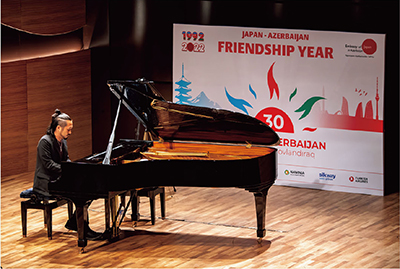 Piano recital by NAKAMURA Tempei (July 18, Baku, Azerbaijan)
Piano recital by NAKAMURA Tempei (July 18, Baku, Azerbaijan)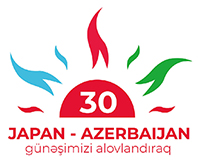 Logo for Japan-Azerbaijan Friendship Year 2022
Logo for Japan-Azerbaijan Friendship Year 2022 Logo for the 30th anniversary of the establishment of diplomatic relations between Japan and Georgia
Logo for the 30th anniversary of the establishment of diplomatic relations between Japan and Georgia

